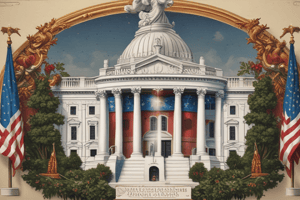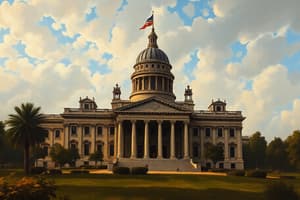Podcast
Questions and Answers
What historical era marked an expansion of federal power with the implementation of the New Deal programs?
What historical era marked an expansion of federal power with the implementation of the New Deal programs?
- The Great Depression (correct)
- The Progressive Era
- The Gilded Age
- The Roaring Twenties
What constitutional concept experienced a revival in the mid-20th century due to challenges to an expansive view of federal power?
What constitutional concept experienced a revival in the mid-20th century due to challenges to an expansive view of federal power?
- Cooperative Federalism
- Enumerated Powers Federalism (correct)
- Dual Federalism
- New Federalism
How does federalism help nations manage cultural or linguistic differences within their borders?
How does federalism help nations manage cultural or linguistic differences within their borders?
- By centralizing all decision-making processes
- By enforcing a uniform national culture
- By promoting regional autonomy (correct)
- By discouraging inter-jurisdictional competition
What recent phase in federalism has raised concerns about weakening democratic norms in the United States?
What recent phase in federalism has raised concerns about weakening democratic norms in the United States?
How does state innovation in federalism potentially impact regional dynamics within a country?
How does state innovation in federalism potentially impact regional dynamics within a country?
Which of the following statements about Enumerated Powers Federalism is true?
Which of the following statements about Enumerated Powers Federalism is true?
What was the primary purpose of the Thirteenth and Fourteenth Amendments during the Fundamental Rights Federalism phase?
What was the primary purpose of the Thirteenth and Fourteenth Amendments during the Fundamental Rights Federalism phase?
Which of the following statements accurately describes the concept of federalism?
Which of the following statements accurately describes the concept of federalism?
What was the primary motivation behind the adoption of Enumerated Powers Federalism during the drafting of the U.S. Constitution?
What was the primary motivation behind the adoption of Enumerated Powers Federalism during the drafting of the U.S. Constitution?
Which of the following statements accurately describes the relationship between the federal and state governments under the concept of federalism?
Which of the following statements accurately describes the relationship between the federal and state governments under the concept of federalism?
Flashcards are hidden until you start studying
Study Notes
Federalism
Federalism is a system of government that divides powers between different levels of government, typically between a central government and smaller units, such as states or provinces. It allows for a degree of autonomy for the smaller units while ensuring that the larger unit has the ability to manage key issues related to national defense, international relations, and shared resources. The concept of federalism has evolved throughout history, with various phases reflecting changes in the interpretation of the relationship between the federal and state governments.
Enumerated Powers Federalism
At the time of the U.S. Constitution's drafting, the concept of federalism was based on Enumerated Powers Federalism. This approach grants specific, enumerated powers to the national government, with any remaining powers being retained by the states or the people themselves. This balances the need for a strong central government with the desire to protect state sovereignty.
Fundamental Rights Federalism
In the aftermath of the Civil War, federalism evolved through a phase known as Fundamental Rights Federalism. This period saw the passage of amendments like the Thirteenth Amendment (abolishing slavery) and the Fourteenth Amendment (guaranteeing equal protection under the law), which were designed to strengthen the national government's ability to enforce certain fundamental rights.
New Deal Federalism
The Great Depression led to another shift in federalism with the implementation of the New Deal programs during the 1930s. This era marked an expansion of federal power, as the federal government took on a more active role in regulating various aspects of economic life. The Supreme Court began to challenge this expansive view of federal power in the mid-20th century, leading to a revival of Enumerated Powers Federalism.
Modern Federalism
Today, federalism is seen as a way for nations to address regional autonomy and manage cultural or linguistic differences within their borders. It can help prevent conflict between diverse communities while fostering inter-jurisdictional competition that encourages innovation and keeps the overall government's focus on primary responsibilities.
Risks of Federalism for American Democracy
Recent years have seen a new phase in federalism, marked by increasing polarization and, in some cases, attempts to nullify laws passed in other jurisdictions. This has led to concerns about the long-term viability of the system, as state innovations may intensify regional conflict and weaken the democratic norms that hold the country together.
Studying That Suits You
Use AI to generate personalized quizzes and flashcards to suit your learning preferences.




